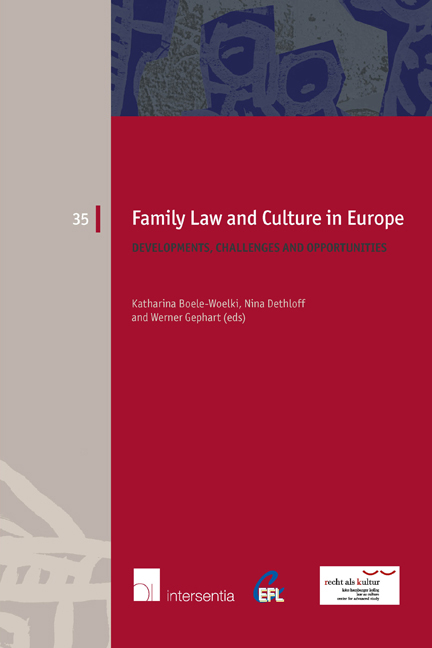Book contents
- Frontmatter
- Preface
- Contents
- List of Authors
- PART ONE THE CEFL PRINCIPLES ON PROPERTY RELATIONS BETWEEN SPOUSES
- PART TWO BREAKUP OF (NON-)FORMALISED RELATIONSHIPS
- PART THREE NEW CONCEPTS OF PARENTAGE
- The Right of the Child to Parents
- Contracting on Parentage
- Biological and Social Parenthood
- France: Biological and Social Parentage
- Anonymous Relinquishment and Baby-Boxes: Life-Saving Mechanisms or a Violation of Human Rights?
- Cross-Border Surrogacy: Time for a Convention?
- Re-Thinking Family Law: A New Legal Paradigm for Stepfamilies?
- PART FOUR INTERNATIONAL FAMILY RELATIONSHIPS
- PART FIVE TRANSNATIONAL FAMILIES: ACROSS NATIONS AND CULTURES
- EUROPEAN FAMILY LAW SERIES
Re-Thinking Family Law: A New Legal Paradigm for Stepfamilies?
from PART THREE - NEW CONCEPTS OF PARENTAGE
Published online by Cambridge University Press: 22 November 2017
- Frontmatter
- Preface
- Contents
- List of Authors
- PART ONE THE CEFL PRINCIPLES ON PROPERTY RELATIONS BETWEEN SPOUSES
- PART TWO BREAKUP OF (NON-)FORMALISED RELATIONSHIPS
- PART THREE NEW CONCEPTS OF PARENTAGE
- The Right of the Child to Parents
- Contracting on Parentage
- Biological and Social Parenthood
- France: Biological and Social Parentage
- Anonymous Relinquishment and Baby-Boxes: Life-Saving Mechanisms or a Violation of Human Rights?
- Cross-Border Surrogacy: Time for a Convention?
- Re-Thinking Family Law: A New Legal Paradigm for Stepfamilies?
- PART FOUR INTERNATIONAL FAMILY RELATIONSHIPS
- PART FIVE TRANSNATIONAL FAMILIES: ACROSS NATIONS AND CULTURES
- EUROPEAN FAMILY LAW SERIES
Summary
INTRODUCTION
The impulse to face this issue was prompted by the consideration that the number of separations and divorces as well as the number of second marriages or cohabitations have steadily increased in most of the European countries. As a consequence, nowadays a growing number of children live within a stepfamily. Nevertheless, only a few European systems have elaborated specific legal tools which are apt to regulate the complexity of the ‘interconnected relationships’ existing in these new family structures, while in others, like in Italy, step-parents are still considered as legal strangers to their stepchildren. This situation partially depends on the fact that in several EU countries family law is still based on the traditional nuclear family's paradigm, consisting of a heterosexual couple (one mother/one father) and their own children only. But it is also the result of that recent legal trend that encourages joint parental responsibilities between both legal parents, regardless of their legal status (married or unmarried at the time of the birth, separated, divorced or no longer living together, if unmarried at the time of the birth). For instance, in Italy, as a consequence of the introduction of continued joint parental responsibilities in case of a family breakdown, it becomes very difficult for the spouse of a parent to obtain a ‘step-parent adoption’, which up to now has been the only legal tool which enables, under certain conditions, the relationship between step-parents and their stepchildren to be legalised. The above-mentioned circumstances make it clear that a comparative reflection on this matter can be useful, also from the perspective of the harmonisation of the legal solutions in the European framework.
Following this path, in this article we will summarise the main legal issues arising from stepfamilies and the related theoretical problems and then we will quickly provide a comparative overview of the legal solutions adopted at a state level in Europe. We will mainly focus on the Italian, Danish, German, Swiss, French and United Kingdom legal systems as examples of three different approaches to the controversial attribution of parental responsibilities to the step-parent.
- Type
- Chapter
- Information
- Family Law and Culture in EuropeDevelopments, Challenges and Opportunities, pp. 217 - 228Publisher: IntersentiaPrint publication year: 2014



